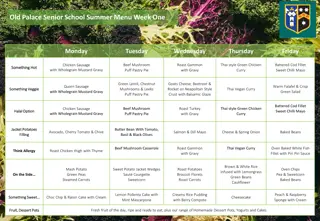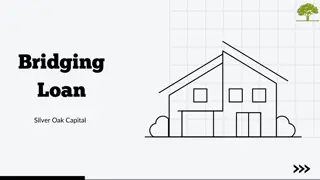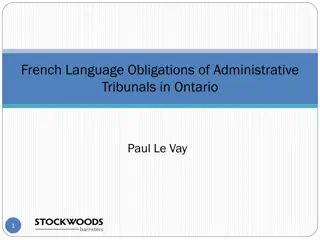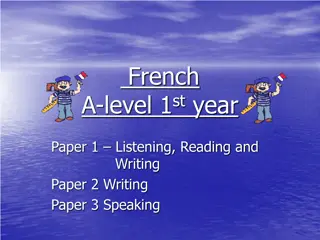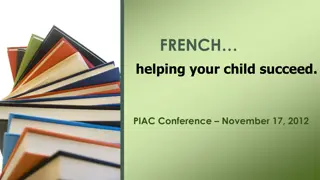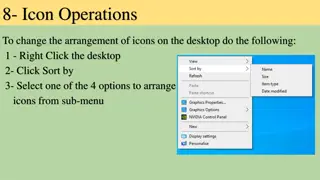French Bridging Menu for A-Level French Study Journey
Embark on an exciting journey into the world of French A-Level with this comprehensive French Bridging Menu. Choose from various modules to complete at your own pace, ranging from literature, podcasts, museum tours, news exploration, film reviews, grammar practice, and more. Work consistently through the green core tasks, with optional challenging red tasks available. The menu offers a diverse range of activities to enhance your French language skills before your first lesson in September.
Download Presentation

Please find below an Image/Link to download the presentation.
The content on the website is provided AS IS for your information and personal use only. It may not be sold, licensed, or shared on other websites without obtaining consent from the author. Download presentation by click this link. If you encounter any issues during the download, it is possible that the publisher has removed the file from their server.
E N D
Presentation Transcript
French Bridging Menu You are about to start an exciting journey into the world of French A level well done! Remember: Choose what modules you do and when, but work through them consistently. Different tasks will take you varying amounts of time - on average you should aim to do one or two per week All green tasks are core modules - they are compulsory and they must be completed and brought to your first lesson in September The red chilli indicates that the task is more challenging than the others Numbers eg (1) correspond to how you should evidence the module which can be found in the slides following the menu. You can download a copy of this PowerPoint and add in your answers. Bon travail et bon courage!
French Bridging Portfolio (All green tasks are those which are compulsory elements of your portfolio) Read Watch Listen Visit Do (virtually or physically at a later date) News Film/TV review (3) Watch and review a French film, short film, or TV episode. Podcasts Grammar Practise the following: Present tense Perfect tense with avoir Perfect tense with tre Imperfect states of being, habitual actions Perfect vs. imperfect Museums (4) Go on a virtual museum tour of one of the museums and complete the task. Mus e du Louvre Mus e d'Orsay Mus e de l'orangerie Mus e du quai Branly News log (2) Explore a topic/topics from the news in different French media and keep a log of what you find. Le festival de Cannes (6) Listen to the podcast episode and complete the tasks. Les bandes dessin es Watch this video about the history of comics in French and answer the questions (6). La famille en confinement (5) Episode: parents et confin s ensemble (middle of webpage). Le confinement en France (5) Article about lockdown in France during the coronavirus pandemic. Upload a photo of your work to the your locker on Unifrog. Literature in French or in translation Interview with Emma (comics writer and illustrator) about emotional labour on the Radio T l vision Suisse (9). La revue de la semaine (2) Weekly look at French politics by politician Jean-Luc M lenchon. French at university (1) Explore the section for French and other associated degrees in the 'Geek Out' section on Unifrog. Short stories: Le petit prince (Antoine de Saint-Exup ry) Famous French story, also available as audiobook. (1) La parure (Guy de Maupsassant) Famous short story. (1) French regional stereotypes Watch the video for 'Chez moi (Big Flo & Oli). Click CC in the bottom right for French subtitles. News in slow French (2) Updated several times a week with news stories and reflections on lockdown. Novel: La peste (Albert Camus) Novel about a plague outbreak in Algeria. (1) Music (3) Explore one or more artists on LyricsTraining. Watch their videos, read the lyrics closely and practise with the gap fill tasks. Write a response in French. Research and explain the regional stereotypes : French monuments (4) Go on a virtual tour of one or more of these and complete the task: Bordeaux Normandie Lyon Marseille Saint-Etienne la Bretagne (Brest/Rennes) Paris Montpellier Nantes Toulouse Poems: Demain d s l aube(Victor Hugo) A classic 19th-century poem frequently taught in French schools. Text and English translation. (1) Les Hiboux (Robert Densnos) Often taught in French schools. Reading and video. (1) Languages and linguistics The linguistic genius of babies (1) Lecture on how babies collect data from the world around them to learn how to talk. Palais Garnier Eiffel Tower Cath drale de Strasbourg Ch teaux de la Loire: Angers Chambord Grotte de Lascaux Le Mont St Michel (here and here) Bastille fort in Grenoble Suggestions: Ang le Stromae Zaz Indila C ur de pirate MC Solaar Kyo Les bandes dessin es (7) Choose one of the comics and respond to the question prompts. What our language habits reveal (1) Lecture by famous linguist Steven Pinker. Upload your answers to your locker on UniFrog and
(1) Literature/Podcast/Lecture review Would you/would you not recommend it? Why? Rating: Review by: ___________________________________________ Title: _______________________________________________________ Author: ____________________________________________________ Review of (please circle) Book Journal Podcast Film Documentary What was it about? What did you find particularly interesting/inspiring/shocking? Has this changed your opinion? How does it link to this subject and why is it important? What would you like to learn more about? Save your answers as part of this PowerPoint in your locker and copy the template as many times as you need.
(2) News log 1 jour 1 actu, L'Actu, 20 minutes, Le Parisien You can explore how a topic is discussed on different websites, or you can explore different topics on the same website. Log your findings in the table below. Use these French websites to explore the news (in increasing order of difficulty): Topic Website/link Summary in English Vocab learned (English and French)
(3) Review of French film/short film/TV series/song/musician Films Short films Majorit opprim e, El nore Pourriat (Youtube) L'Homme qui plantait des arbres, Fr d r ic Back (YouTube) (winner of the oscar for best short in 1988) La Jet e, Chris Marker (Vimeo) (winner of the Palme d'Or 1962) Le sang d'un po te, Jean Cocteau L'Auberge espagnole Intouchables La Vie est un long fleuve tranquille Les Demoiselles de Rochefort OSS 177 Le Caire nid d'espions OSS 117 Rio ne r pond plus La Grande vadrouille Les Vacances de Monsieur Hulot La Haine (you will study this film next year) On Amazon Prime: Back to Burgundy Once in a Lifetime Franz What's in a Name Am lie Dinner Game 120 BPM Little White Lies Divines Faces Places School of life D licatessen TV Series Call My Agent (Netflix) A very Secret Service (Netflix) Fais pas ci, Fais pas a (YouTube, S01E01 here) Marseille (Amazon Prime) On Netflix: La famille B lier Albert Camus Madame Bovary Give your opinion, in French, of the film/ pisode you watched, answering these questions: Quels sont les th mes principaux du film/de l pisode/de la chanson? Quelle impression t'a-t-il laiss ? As-tu aim la fin? Est-ce que tu recommenderais ce film/cet episode/cette chanson un(e) ami(e) ? Pourquoi ? (If you install the Language Learning with Netflix extension on your browser you can have French and English subtitles simultaneously!)
(4) Virtual museum tour Choose whether you would like to write: an informative flyer the museum/monument a blog post about visiting the museum/monument a description of a work of art/monument, why you chose it and your opinion. Guidelines: Write in French. Include information and opinions. Try to include a range of GCSE Grade 8/9 structures (conditional, subjunctive, imperfect etc.)
(5) Le confinement en France 1.Read this document and answer the questions: Find the following words and expressions: the entire world contagious a cold diseases flu - (it) worries a bat a human being to spread out coughs (v) - sneezes (v) - to forbid. How did the coronavirus appear? When was the first patient oustide China discovered? What are we doing around the world to avoid contamination? 2. Now read this second document and answer the questions: Translate the expressions in bold in the top section titled "L'Etat prend des d cisions importantes" (in orange): "environ 140 h pitaux" - "des chambres sp ciales" - "prendre en charge tr s vite les personnes malades" - "plusieurs million de masques" - "l obligation de fermer" - "plusieurs v nements". Summarise in English the four steps taken by the French government when dealing with the spread of coronavirus. After reading the section "Et toi, tu peux faire quoi ?" (in yellow), complete the sentences in English: 1. If you touch an infected ______ and you bring your ____ to your ____, you risk contamination. 2. In order to protect them, you must ____________ to your personal hygiene. 3. Wash your hands every _________ with soap or use hydroalcoholic gel (hand sanitiser) 4. Use throw away ______. 5. Cough or sneeze inside your _____ in order to avoid to sputter. 3. Listen to this podcast about parents and teenagers being confined together and answer the questions: Qu'est-ce qui a chang pour l'organisation de la famille ? Quelle est la nouveaut par rapport aux repas ? Comment se passe la cohabitation pour cette famille ? Quels sont les c t s positifs et les c t s n gatifs du confinement ? Quelles importantes discussions le p re a-t-il eues avec ses filles ? Qu'est-ce qui manque le plus la famille ? Comment imaginent-ils et elles l'apr s-confinement ?
(6) Le festival de Cannes 1. Listen to this episode of the Coffee Break French podcast on the Cannes Film Festival, a world-renowned event which happens every year in the South of France. Listen to the first 3:46 minutes and then pause the podcast. While listening, take notes of what you understand. Listen to it once more if you need to. Once you have paused the podcast, summarise what you have understood from the text Susie read. These questions should help you know what to listen for (you don't have to answer all of them, work with what you understand): When does the festival happen? How long does it last? Who goes to the festival? Where does it take place? What do they celebrate? When was the festival created? What happens in this festival? What is the most prestigious prize called? When was the first edition supposed to happen and who was supposed to preside over it? Why was it cancelled? Where do the projections happen? Why do tourists, spectators and journalists come to the festival? Then listen to the rest of the podcast, and make notes of the vocabulary or grammar points they explain and you didn't know. 2. Research the following : Le septi me art (what it means) La Palme d'or Louis Lumi re La mont e des marches If you are interested in other episodes, the podcast is available on Spotify.
(7) Watch la bande dessine 1. First, read these facts about comics: La "BD" veut dire "bande dessin e" - une s rie d'images avec de courts textes. Il y a une grande tradition de la BD en France et en Belgique. Environ 5000 bandes dessin es sont publi es chaque ann e en France. Il y a beaucoup de festivals de la BD en France et en Belgique. Le plus c l bre est le Festival de bande dessin e d'Angoul me, qui a lieu tous les ans dans le Sud Ouest de la France. C'est l'un des plus importants au monde : chaque ann e, il re oit 6000 professionnels de la BD et 220 000 visiteurs. 2. Now watch this video about the history of "la bande dessin e". (The text is transcribed below which you can use to help you understand, but try as much as possible to not use it in order to work on your listening.) 3.Answer the following questions on comics do some research if you need to. O sont apparues les premi res BD en France ? Est-ce le seul public pour cette forme ? Qui est Tintin, et que racontent ses aventures ? Qu'est-ce la BD est nomm e "le neuvi me art" ? Pourquoi a-t-on donn ce nom la BD ? Qu'est-il arriv en 2016 au festival d'Angoul me ? Pourquoi penses-tu que a a cr une controverse ? Qu'en penses-tu ?
(8) Read les bandes dessines Choose at least one comic from the list, and answer the corresponding questions: Boule et Bill, Jean Roba Qu'est-ce qui se passe dans cette BD ? Pourquoi la maman est-elle agac e ? Penses-tu que sa col re est justifi e ? Que dit cette courte BD de l'organisation dans les familles ? Cette planche date de 2008. Penses-tu qu'elle est toujours d'actualit ? Fallait demander, Emma Quel est le concept cl expliqu par la BD d'Emma ? Explique avec tes propres mots ce qu'est 'la charge mentale'. Pourquoi est-ce plus encore difficile changer que le partage des t ches m nag res ? D'apr s ce que tu sais, la situation a-t-elle volu ces derni res ann es ? Pourquoi ? Propose quelques solutions dont tu penses qu'elles pourraient aider compenser cette in galit . La queue du Marsupilami, Batem, Greg et Andr Franquin Pense aux dynamiques raciales/coloniales de cette bande dessin e : d'o vient chaque personnage (Bring M. Backalive, le "capitano", Sacristano Tezh b t , Tapamilastiko) ? Quelle est son statut, et sa relation aux autres personnages ? Observes-tu une hi rarchie ? Page 19, le chasseur dit "Aah, je vois jeune homme que nous sommes blouis par les merveilles de la civilisation...", et appelle les natifs des "sauvages". Qu'est-ce qu'il insinue propos des populations indig nes ? La BD semble-elle montrer son attitude sup rieure et paternaliste comme justifi e ? La fin, page 48, nous offre une morale : "Alors que le Marsupilami est parfaitement adapt au terrible climat humide de la for t palombienne, rares sont les pr dateurs venus d'ailleurs qui y r sistent longtemps sans dommage... Et voil pourquoi cette r gion fascinante restera longtemps inaccessible aux m faits de la civilisation !" Quel est le point de vue de la BD sur "la civilisation" cherchant s'imposer dans cette for t primaire riche ? Cette BD date de 1987. Sa pr diction est-elle toujours valable aujourd'hui ?
(9) Interview with Emma, comics artist Interview with Emma (comics writer and illustrator) about mental labour on the RTS. (French subtitles available: click on the little gear on the bottom right of the video and turn the "sous-titres" on). Watch up to 4:49, taking notes of the important ideas she conveys. Watch it again if you need to, and answer the following questions: Pourquoi le mot "aider" pour d crire le r le de l'homme la maison pose-t-il probl me ? Quel concept a-t-elle aid populariser ? Donne une d finition avec tes mots. D'apr s Emma, quelles raisons font que c'est la femme, dans un couple h t rosexuel, qui porte g n ralement la charge mentale ? Quelles solutions propose-t-elle pour changer les choses concernant l' galit homme-femme, le climat, etc. ? Que dit-elle sur la diff rence entre la politesse et la galanterie ?





